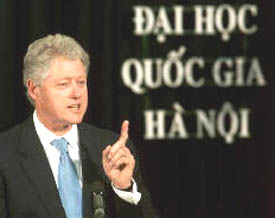 |
International Affairs
‘People’s War’ & a Dangerous Foreign Policy
Toby Westerman
A "peoples war" against U.S. troops in Iraq is being encouraged by the politicians and generals of Vietnam, a nation which still has a close "ideological relationship" with its giant neighbor to the north, Communist China, according to one U.S. immigrant activist.
Articles appear daily in Vietnam advocating the strategy of a "peoples war" in Iraq and denouncing U.S. "imperialism," declared Vietnamese-American writer and activist Duc Tran in an exclusive interview with International News Analysis Today.
The articles condemning the U.S. and supporting the Islamic militants appear in both Vietnamese and English language newspapers, according to Tran.
The concept of "peoples war," was successfully used against the French and Americans in Southeast Asia. In a "peoples war," small bands of fighters intentionally provoke an overwhelming military response, with the result that a small number of guerrillas may be lost, but the enemy is worn down emotionally and financially. Should women and children be killed during an enemy counter attack, the result for the communist guerrillas is even more positive, because images of dead civilians give the enemy a "bad press."
Leftist media outlets are essential to a successful "peoples war," and are used to emphasize the horror of the attack on the guerrillas - a situation which the U.S. encountered in Vietnam and is again experiencing in Iraq.
Born in 1972, Tran came to the U.S. in 1990 with his family. Tran's father was a member of the South Vietnamese Assembly, and was imprisoned in a labor camp for six years after the fall of the South Vietnam.
From the mid-1950s to the 1970s, the United States supported the anti-communist South Vietnamese government against communist-controlled North Vietnam.
Although North Vietnamese military under the direction of General Giap never won a single major victory against U.S. forces, mass street demonstrations in the U.S. and American media hostile to U.S. intentions in Vietnam forced an American withdrawal in 1973. The Democratically controlled Congress cut off all military assistance to South Vietnam, and, in 1975, Saigon, the South Vietnamese capital, fell to North Vietnamese forces.
Tran continues to follow events in Vietnam, and warns that U.S. policy toward Vietnam is dangerously uninformed.

Clinton established closer US ties with Vietnam, giving the government the means to remain in power - AP/Wideworld Photos |
Tran realizes that he is bucking a strong trend favoring close ties between the U.S. and Vietnam. Since U.S. President Bill Clinton normalized relations in 1995, the level of trade, commercial, and manufacturing has quickly risen. There is even a direct air link from San Francisco to Ho Chi Minh City (formerly Saigon).
In a May 5, 2005 press briefing, U.S. Ambassador At-Large for International and Religious Freedom John Hanford stated that Vietnam had made certain "commitments," including the release of several prisoners, which now offer a "strong foundation" for substantial improvement in the area of religious freedom.
Tran told INA Today that the recent release of prisoners is a ploy, and that religious persecution will reappear when Hanoi believes that repression is useful for the aims of the Marxist state.
Reform remains superficial in Vietnam, which is firmly under the control of the Communist Party elite. Houses of worship have been destroyed in large numbers. Dissidents, including Christian and Buddhist believers, are still liable for imprisonment, and the Montagnard tribes of the Central Highlands remain targets for deadly assault.
Some experts assert that Vietnam could be part of a U.S. strategy to balance the fast growing influence of China in the Asia-Pacific region. Vietnam did fight a brief border war with China in the late 1970s, forcing Beijing to withdraw its forces, and rivalry between Vietnam and China goes back many hundreds of years.
Although there have been past disputes between Vietnam and China, Tran observed that the close "ideological relationship" between the ruling elite in Hanoi and Beijing render any attempt to use Vietnam against China completely unrealistic. Hanoi shares the same belief in Communist Party domination - and eventual triumph over "imperial" America - as does China, North Korea and Cuba, Tran declared.
In response to continuing Communist Party oppression in Vietnam, several Vietnamese organizations and U.S. veterans groups will protest the upcoming visit to the U.S. of Vietnam's Prime Minister Phan Van Khai on June 21, 2005.
Tran emphasized to INA Today that he will continue to work for increased involvement of Americans of Vietnamese origin in the U.S. political process, and warns all Americans to carefully guard their rights and freedoms - because others still want to take them away.

Posted May 24, 2005
Toby Westerman publishes
International News Analysis - Today
An investigative and uncompromising weekly analysis of the world situation
Contact T. Westerman at
www.inatoday.com
or P.O. BOX 5182, Rockford, ILL, 61125-0182
|
International Affairs | Hot Topics | Home | Books | CDs | Search | Contact Us | Donate

© 2002- Tradition in Action, Inc. All Rights
Reserved
|
 |
|